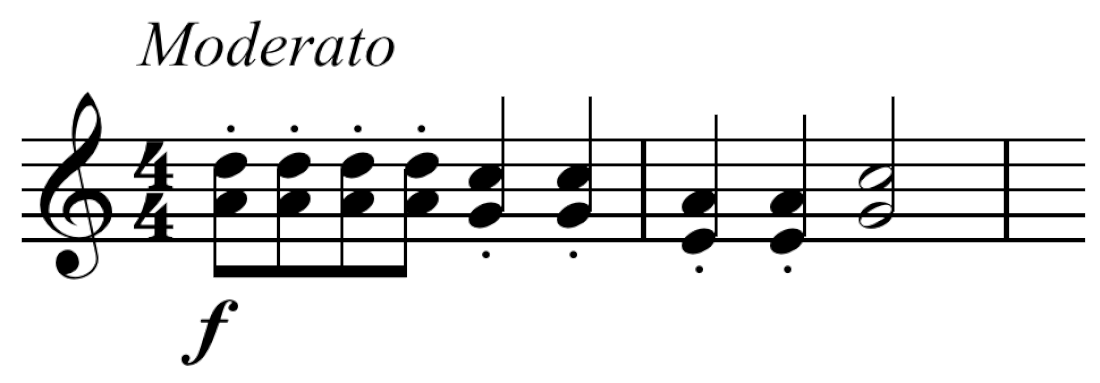Top Qs
Timeline
Chat
Perspective
Oriental riff
Musical riff or phrase From Wikipedia, the free encyclopedia
Remove ads
The Oriental riff, also known as the East Asian riff and the Chinaman lick, is a musical riff or phrase that has often been used in Western culture as a trope to represent the setting or people of East or Southeast Asia. The riff is sometimes accompanied by the sound of a gong at the start.


Remove ads
History
The Oriental riff is a Western creation. The first known example of a precursor, showing similar rhythm if not yet melody,[2] is the "Aladdin Quick Step", composed around 1847 and used in an Aladdin stage show named The Grand Chinese Spectacle of Aladdin or The Wonderful Lamp.[3][4][5] Later related tunes included "Mama's China Twins (Oriental Lullaby)" from 1900. In the 1930s, a couple of cartoons used a version of the tune specifically to accompany animated stereotypes of East Asians.[3]
The notes used in the riff are part of a pentatonic scale and often harmonized with parallel open fourths, which makes the riff sound like East Asian music to casual Western listeners.[6] Ravel's use of these devices in his opera L'Enfant et les sortilèges has been identified as one example of how Western composers employed pentatonic scales and parallel fourths to signify chinoiserie, or East Asian character, through the riff.[7]
Remove ads
Uses
Summarize
Perspective
The Oriental riff and interpretations of it have been included as part of numerous musical works in Western music. Examples of its use include Poetic Tone Pictures (Poeticke nalady) (1889) by Antonin Dvořák,[8] "Limehouse Blues" by Carl Ambrose and his Orchestra (1935), "Kung Fu Fighting" by Carl Douglas (1974), "Japanese Boy" by Aneka (1981),[1][4] "Turning Japanese" by The Vapors (1980),[4] "Chinese Laundry Blues" by George Formby (1932), Rush's "A Passage to Bangkok" (1976),[4] and as part of the whistling refrain in "Young Folks" by Peter Bjorn and John (2006).[4]
The Oriental riff has also come to be used in many Japanese compositions, particularly in video games; these include Yie Ar Kung-Fu's main theme, the Chai Kingdom theme in Super Mario Land, Dragon Chan and Hoy Quarlow’s theme in Super Punch-Out!!, Min Min's theme in ARMS, the Team China stage in Super Dodge Ball, the song "Shao Pai Long" in The Super Dimension Fortress Macross, the fighting theme of the Kung-Fu chapter in Live A Live, the Wabi Sabi Wall theme in Ape Escape, and the track "Enter The Tiger" in Yakuza: Like a Dragon. Unlike the Western use of it seen in cases such as "Turning Japanese", works produced in Japan often use it to give an impression of China.[citation needed]
The Chinatown level in Scooby-Doo! Unmasked has a soundtrack inspired by the Oriental riff.[9]
Both themes for Samurai Pizza Cats and Kyatto Ninden Teyandee uses a casually similar rhythmic melody to the Oriental riff which can also be heard during other soundtracks that play in certain episodes of both versions of the show.
Remove ads
See also
- Arabian riff
- Tarantella Napoletana, representing Italy
- Stereotypes of East Asians
- Wonton font
References
Wikiwand - on
Seamless Wikipedia browsing. On steroids.
Remove ads

